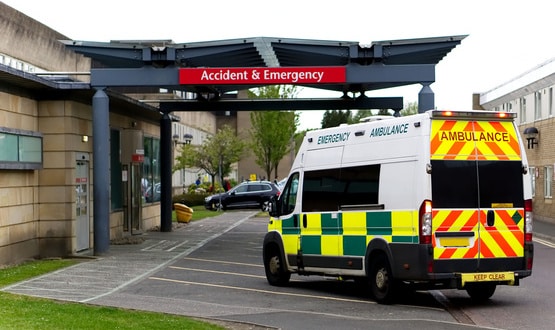AI predictive trial in Staffordshire reduces A&E admissions by 35%
- 11 August 2022

A trial which looked at how existing patient data could be used to predict those most likely to need hospital care has led to a 35% reduction on average in A&E attendances across Staffordshire.
The aim of the trial was to look at how existing patient data could be used to predict those most likely to attend A&E or need hospital care in the near future and intervene with targeted clinical coaching to reduce their dependence on A&E and GP services.
The project was led by Dr Paddy Hannigan, chair of the Stafford and Surround Clinical Commissioning Group (CCG) and clinical lead for Staffordshire & Stoke-on-Trent Integrated Care System (ICS) digital programme, who launched the trial with two of the six CCGs and three acute hospitals in 2016.
When the trial first began, CCGs were firmly the statutory organisations in place, however, in July 2022 they were dissolved to make way for ICSs following the Royal Assent of the Health and Care Bill.
CCGs therefore no longer exist, but for the duration of this randomised control trial they were still the organisations responsible for achieving the best health outcomes for local populations.
Dr Hannigan spoke exclusively to Digital Health News alongside Mark England, CEO at HN, about how the project works, the positive results that have come from it, the challenges faced along the way, and the exciting future plans for both Staffordshire ICS and HN.
Promising results
Stafford and Surrounds CCG, which is now part of the Staffordshire and Stoke-on-Trent Integrated Care Board (ICB), wanted to develop an AI-driven process that could alleviate pressure on the system and staff while at the same time, providing a better patient experience. The obvious choice of software to achieve this was HN’s Predict solution.
The software is specifically designed for clinicians and those involved in planning care, enabling organisations to accurately and efficiently identify patients at risk of adverse and preventable events such as uncontrolled disease progression, hospitalisation and prolonged hospital stay.
Using HN Predict, Staffordshire was able to identify and prioritise people with risk of worsening health conditions in real-time by analysing their patient records. The algorithm targeted individuals who were likely to consume three or more acute hospital bed days in the next six months or require an increase in GP-led care.
The results of the trial have been extremely promising, with a 35% reduction in A&E attendances on average and a 30% reduction per patient in the average total hospital care cost, which has been to the delight of project leader Dr Hannigan.
He said: “There’s a very clear benefit in terms of the outcome from the trial and what’s been done. We can see significant reductions in A&E attendances so from a system point of view, there are clear and positive benefits of what we’re trying to do.”
The success of the trial has been down to the relationship between Staffordshire and HN and the ability to co-design the solution together, according to HN’s CEO Mark England.
“Developing software and developing data models is an expensive process and you’ve got to make sure it’s exactly attuned to what people want and what makes a difference,” he said.
“Having customers like Staffordshire where you can co-design the solution alongside them is the only way to navigate the complexity of healthcare systems.”
Not without its challenges
The project has been a multi-year journey and an obvious challenge was the Covid-19 pandemic getting in the way of everything, however there were some less obvious challenges too, including persuading different teams of the potential benefits of machine learning.
Dr Hannigan said: “When I’m having conversations with operational teams who are probably quite far away from the whole concept of data and machine learning, it’s sometimes difficult to persuade colleagues of the potential and the benefits.
“Good outcomes and the positive and powerful data we noticed meant I could convince people to try this at scale.”
HN’s CEO highlighted another challenge off the back of this project when speaking to Digital Health News, based on taking a multi-year approach.
“Prediction prevention requires a time horizon, which is sometimes really difficult in the NHS to take on board. Our intervention does deliver in year benefits but taking a multi-year approach is one of the challenges,” he explained.
“You really need to set it up, scale it, get it embedded and roll it across three years to develop real world evidence and that’s what we’re starting to do in Staffordshire.
“Now we’re scaling the service up but taking a multi-year approach is one of the problems because budgets were being released on a six-monthly basis during Covid, so there’s never been any real certainty as to what the funding is,” he added.
What lies ahead for both Staffordshire ICS and HN?
The AI-guided clinical coaching intervention project is not the only project that Staffordshire ICS and HN are working on, as the pair have also joined forces to actively work together on their Frailty and Health Ageing programme.
The aim is to see how data prediction methods might work for patients at risk of falls and will also be considered for those who are at a higher risk of delayed discharge from hospital should they be admitted.
On the Frailty and Ageing project, Dr Hannigan said: “The main ambitions are finding out whether we can predict people whose level of frailty is going to change most rapidly.
“We’ve got 30,000 patients who are moderately frail, 10,000 with severe frailty and we have 3,000 slots in our frailty multidisciplinary team service, so we need to find out how we can deploy the people who will have the most benefit and how we can apply them evenly.
“It is going to be a big issue for ICSs like ourselves to make sure that we get a more even spread of resources.”
HN is playing a key role once again to help intervene early and reduce the number of patients that become severely frail. England believes the syndrome is avoidable if it is tackled in the early stages.
He said: “The NHS starts to focus on people when they are severely frail and right towards the end of life. They’re causing lots of patients to receive some really poor care and poor outcomes because they’re being conveyed into hospital which isn’t an appropriate place for them as they get avoidable harm and they decondition.
“Frailty is a syndrome that is quite reversible and manageable in its early stages and if we find those people early enough, we can really help. If we can intervene and make a big difference, that would really alter the quality of someone’s later years in life, so I think it’s a really important area.”
As well as their work with HN, Staffordshire and Stoke-on-Trent ICS have focussed on digital in other aspects in recent years. Last year, they went live with a digital integrated care record powered by Graphnet.
Known locally as One Health and Care, the digital system is using Graphnet’s CareCentric technology to consolidate information from the region’s care organisations so people won’t need to repeat their health and social care history as often and practitioners will be better able to co-ordinate their care and support.




